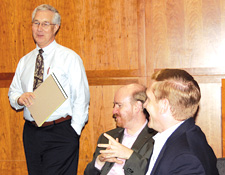Prosecution Clinic | Innocence Project | Strip Searches and Immigration Stops
Clinic a Stepping Stone for Many Young Prosecutors
 |
by Eric Williamson
The reality of burgeoning prosecutorial caseloads has turned into a significant career opportunity for Virginia Law students.
Richard “Rick” Moore ’80, assistant commonwealth’s attorney for Orange County, directs the year-long Prosecution Clinic, placing students with participating state and federal prosecutors’ offices in Central Virginia—as he has done since taking over the program in 1998.
Moore co-instructs the classroom component (which provides important context to the field office and court experience) with adjunct professor Ron Huber, Assistant U.S. Attorney for the Western District of Virginia.
In many instances, particularly in the Commonwealth’s offices where in-court experience is more likely, students have tried cases, even managed entire court dockets, by the end of their first semester. All students must have a third-year practice certificate from the Virginia State Bar to participate.
Alumni of the clinic have gone on to become professional prosecutors for district attorney’s offices across the country, as well as for U.S. Attorney’s Offices, the Department of Justice, and the Judge Advocate General’s Corps.
As has become custom, Moore and Huber invited a panel of former students to speak during the fall–this time, all currently serving in Virginia as Assistant Commonwealth’s Attorneys. The panelists agreed it was their clinical experience that directly led to the jobs they have today.
“It was outstanding,” said Elliott Casey ’99, who now prosecutes for Albemarle County. “I wouldn’t have gotten the job that I got if I hadn’t worked for Ron [Huber, then an assistant commonwealth’s attorney] and the city of Charlottesville and had the opportunities that he gave me. I learned to practice law from Ron Huber.”
The clinic requires students to work at least one day per week, either in preparation of ongoing cases or by participating in court, but Casey said, “I did every day I possibly could.” Comparing third-year practice to the joy of driving a car, he advised: “You should wake up in the morning and just grab the keys and go.”
If enthusiasm is any measure, a show of hands indicated that the majority of the 30 students will pursue careers as prosecutors. The clinic started with only 12 students. Janet Webb, then an attorney with the Department of Justice in Washington, D.C., taught and ran the clinic for its first four years.
“Just getting the experience of what the job is like both helped me get the job and made me want to go do it,” said Ben Traster ’08 of his internship with the City of Richmond Commonwealth’s Attorney’s Office, which led to his current staff position in Arlington County. “Because I was in Richmond, it was a very busy office, so it just gives you a ton of credibility when go and you interview with someone and say, ‘I know what it’s like to be in court.’”
He and Casey said they don’t know of any other law school that has a program that entrusts students with as much responsibility.
“I know Georgetown has a clinic where they’ll go into Superior Court,” Traster said, “but I don’t think they handle as many cases and have the opportunity to work as closely with the commonwealth’s attorneys.”
Traster was lucky; his search was geographically limited in order to accommodate his wife, Eastern District Assistant U.S. Attorney Kara Martin ’08 (also a clinic alum), and two jobs opened up simultaneously in nearby counties when he was looking.
Carrene Walker ’08, on the other hand, was prepared to travel. She capitalized on her experience in Goochland County to land a job in Pittsylvania County.
“The prosecution clinic is like no other course in law school,” Walker said. “Maybe other clinical courses are similar, but the fact you actually get to try cases and learn what it’s like to be a prosecutor is invaluable. And honestly, you don’t learn how to be a lawyer in law school, but this is one class where you actually do really learn what it’s like to practice, so it’s great.”
A member of the class of 2010 (and the newest state prosecutor on the panel) said about 100 people applied for the position he now holds in the very busy Virginia Beach district, but that the prosecutor’s office only interviewed four or five people. He was fortunate enough to be chosen.
It may have helped that he formerly interned under Casey, who is fond of instilling his enterprising work ethic in others.
“I used to give him my entire docket,” Casey said.
Casey encouraged the class to pull a docket from a few weeks out and call the witnesses proactively. “When you go to court,” he said, “and you know all the people who are going to be there, and you’ve talked to the witnesses, at that point the prosecutor is going to look at you and go, ‘Well, why am I trying the case? You know what’s going on. Here, take it and you try it.’”
When polled, many of the students indicated they would delay their prosecutorial careers, likely starting with a law firm in order to pay off educational debts. But panelists warned against waiting too long and getting used to a more financially comfortable lifestyle.
“Beware of the golden handcuffs,” said Bryan Rhode ’04, reciting a well-worn admonition. “They are heavy and hold tight.”
Rhode, now a prosecutor for the city of Richmond, interned in Orange County, pursued additional education, and worked for Hunton & Williams after law school. But he said he remained focused on his goal of being a prosecutor with the support of his wife, Lynne C. Rhode ’04, an associate at Troutman Sanders.




